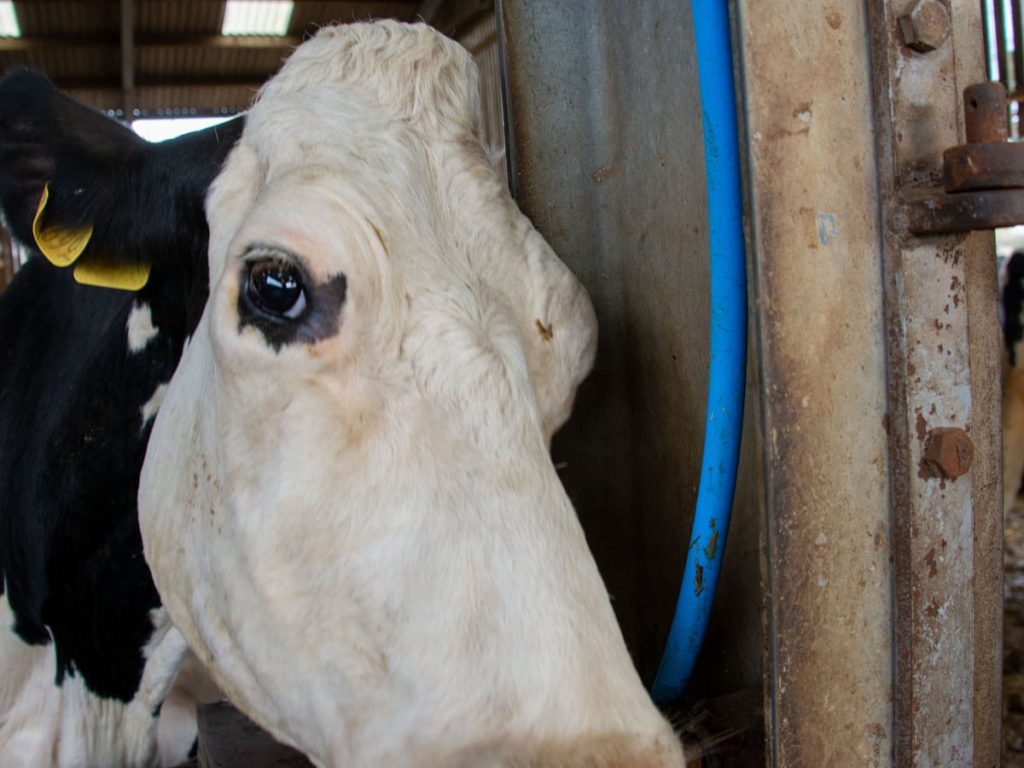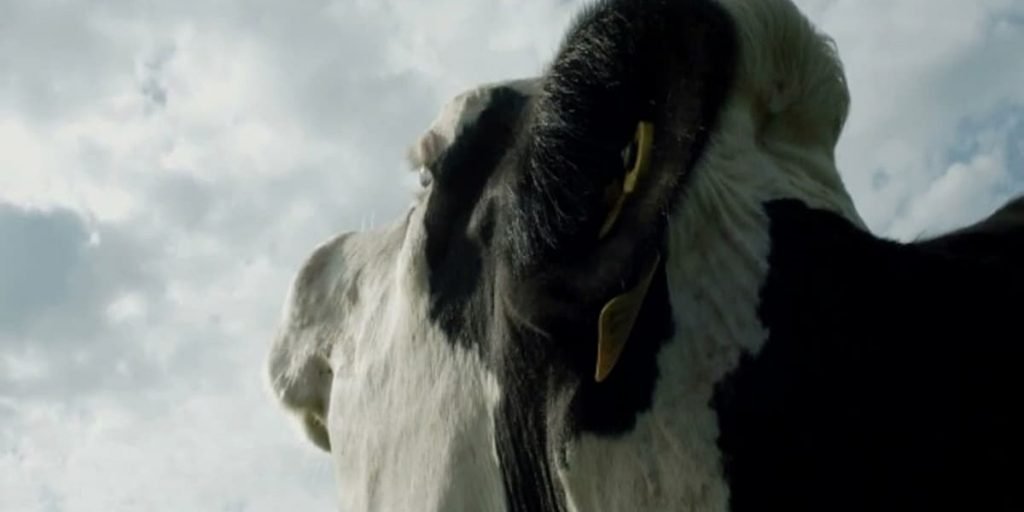In her first documentary feature Cow, Andrea Arnold concocts a deeply profound and strikingly resonant film about a mother’s forced separation from her child.
Andrea Arnold (Fish Tank, American Honey) is no stranger to directing grounded, authentic films that focus on people in troubling situations, and whilst her latest Cow might not be about a human, it still deals with similar issues of abuse and social isolation. Farmyard animals are being given an increased exposure within both fiction and documentary films, from quiet dramas about the birth of consumerism to oddball folky horrors to real world, black and white portraits of pigs. And with the most recent addition to this Farmyard Animal Universe in the form of Cow, there is a clear necessity for these stories – in particular, the real-life ones – to be brought to screen in a bid to inspire tangible change from humans. Arnold proves her worth as a documentarian to be equal to that as a feature film director, through crafting this powerful and painful piece of work.
Cow is effectively split up into three loose parts: dairy farming, freedom in a field, and more dairy farming. Focussing on a cow called Luma at a farm in Kent, England, the documentary follows her journey throughout her impregnation, subsequent birth and continual milking, a harsh cycle which repeats and repeats. Cow immediately sets its grounded, gritty tone from the off, opening with an intensely graphic birth – one which we later find out it’s Luma’s fifth pregnancy – and holding nothing back in its capture of this moment, complete with trailing placenta and plenty of gloop. Calf born and Luma ripe for milking, her new-born is swiftly whisked away, separating mother and child; the cries of Luma for her new calf is difficult to hear. Cow intercuts between the two animals throughout its runtime, its focus mainly on the mother but still finding time to show her child in its early years.
Arnold impressively draws out the inner turmoil of Luma, amplifying her emotions without ever feeling exploitative. Aided by Magda Kowalczyck’s cinematography, the camera is consistently drawn close to Luma’s face to look into the very soul of this tortured being, akin to watching an Ingmar Bergman film at times, but with cows. Or think of Leonardo DiCaprio eyeballing the camera at the end of The Revenant (2015), but with cows. It makes for a stifling, dramatically intense watch, the choking cabin fever atmosphere of the barns amplified to an excruciating degree. Cow is, in its purest form, a fly-on-the-wall documentary, capturing its subjects respectfully without ever intruding. Stellar sound design helps bring the cows’ emotional states to the foreground even further through the intense breathing of Luma in her hardest moments or the distressed calls for her snatched away new-born. It’s penetrating, genuine and deeply immersive.

After following Luma around in the barns for roughly 45 minutes, there is some relief. Cows and calves alike, whilst not reunited, are let out to roam in the surrounding English countryside. The iron confines of the farm are left behind, temporarily at least, and the camera becomes more dynamic as the cows move and run more. The screen seems to expand, with Arnold drawing back from the limitations of the cows’ faces and instead capturing their liberation within the great outdoors. It’s a highly impactful sequence, and a prime example of how best to utilise the potential of film to convey a mood shift and send a message to the audience. Perhaps the most striking moment of Cow – both thematically and visually – is in its shots of Luma looking at a starry night sky as she stands momentarily free, a sentient being reflecting on her position in society. It’s profound, beautiful, but also distressing knowing that Luma and her fellow cows will soon return to the farmyard for the cycle of factory farming to start once again.
As with most documentaries about heavy subjects such as this, there is always the question of why something has been captured and put to film. In Cow’s case, it’s reasons for being made are clear and justified. This is a nature documentary to stand alongside other important ones, whether it be The Cove (2009) or David Attenborough: A Life on Our Planet (2020). The exploitation of animals for commercial gain isn’t a problem limited to the countryside of England, but a universal issue that documentaries like Cow shine an important and urgent light on. Arnold never dictates any messages to the audience but, like the best documentarians do, lets the subjects on camera do the talking. Cow is structurally impressive, starting on the beauty of birth and ultimately, inevitably, ending at the opposite end of the spectrum, inviting the audience to think about their daily decisions that might seem simple and insignificant but have huge consequences for other living beings. If Cow was a fictional film and Luma an actor, it would be an award worthy portrayal of an imprisoned mother being separated from her child, the energy literally seeping out of her body as the film progresses. But it’s not fictional and Luma is not an actor: Cow is real, urgent, and it’s now.
Cow is now streaming exclusively on MUBI in the UK, Ireland, Germany, Austria, Turkey, Italy, India, Latin America & more. The film was released in US theaters by IFC Films on April 8, 2022.

